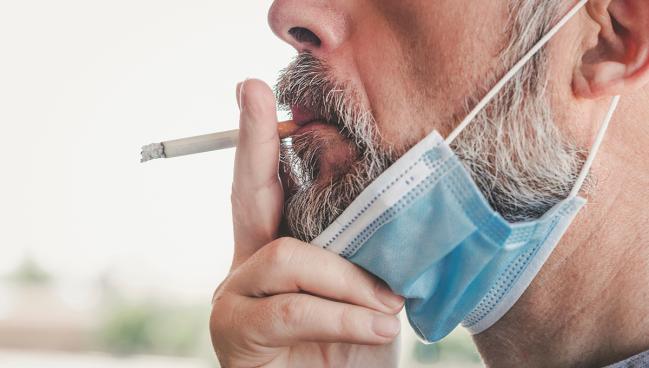Smoking Linked With Worse Outcomes in Hospitalized COVID-19 Patients
The findings confirm previous data showing that smoking exacerbates the adverse consequences of SARS-CoV-2 infection.

Adult smokers hospitalized with COVID-19 are at a significantly higher risk of developing more severe disease, including the need for mechanical ventilation, and a higher risk of death, when compared with nonsmokers, a new analysis shows.
The findings, which were published online recently in PLOS One, “provide the most extensive and robust evidence to date” that smoking exacerbates the adverse consequences of SARS-CoV-2 infection, according to lead investigator Ram Poudel, MD (American Heart Association Tobacco Regulation Center, Dallas, TX), and colleagues.
“We have to live with the fact that some people do smoke,” senior investigator Aruni Bhatnagar, PhD (University of Louisville, KY), told TCTMD. “And people who do smoke need to be extra vigilant about the possibility of severe disease so that they can take appropriate measures or extra precautions about being exposed to COVID. If they actually get COVID, they should seek medical help more promptly because the disease can progress very fast.”
From a clinical perspective, physicians need to be aware of the heightened risk in smokers hospitalized with COVID-19 so that these patients can be monitored closely and treated more aggressively if needed, said Bhatnagar.
In previous meta-analyses, smoking has been linked with a greater risk of dying and developing more severe disease after SARS-CoV-2 infection. However, other observational studies have not identified smoking as a risk factor for mortality or complications, while even others have suggested that smokers might even be at a reduced risk of infection. As the researchers point out, many methodological differences can account for these variations, including the sample population and the diversity of clinical outcomes.
“Some of the studies have been contradictory,” said Bhatnagar. “We thought it would be a good idea to do a large study looking at just the severe outcomes.”
Direct Evidence of Smoking as ‘Injurious’
This analysis included 31,545 adult patients admitted between January 2020 to March 2021 to one of the 122 hospitals participating in the American Heart Association (AHA) COVID-19 CVD registry. Because the demographic and medical histories of smokers differed significantly from the nonsmokers, investigators used propensity-score matching to compare outcomes of 2,239 smokers with 4,478 nonsmokers. Baseline characteristics were well balanced after matching.
On multivariate analysis, smokers hospitalized with COVID-19 had a significantly higher risk of death than nonsmokers (adjusted OR 1.41; 95% CI 1.21-1.64). Additionally, they had a higher risk of needing mechanical ventilation during their hospital stay (adjusted OR 1.15; 95% CI 1.01-1.32). Smoking was also associated with a higher risk of major adverse cardiovascular events, a composite that included acute MI, heart failure, cardiogenic shock, ischemic stroke or intracranial hemorrhage, myocarditis, or CV death (adjusted OR 1.27; 95% CI 1.05-1.52).
“This is the clearest direct evidence showing that smoking itself could be injurious and could compromise outcomes in people with COVID-19,” said Bhatnagar.
In subgroup analyses, smoking was a stronger risk factor for mortality in patients ages 18 to 59 years than in older patients and also appeared to be a stronger risk factor in females than in males. Finally, smoking was associated with higher risks of death in white and obese patients; those who had diabetes, hypertension, and chronic kidney disease; and those who received anticoagulant therapy prior to hospital admission. Smoking was associated with a higher risk of mechanical ventilation in female and Hispanic patients, as well as those hospitalized early in 2020.
As for why the association between smoking and mortality was stronger in younger COVID-19 patients, Bhatnagar said these patients are at an overall lower risk than older patients. As such, smoking has an outsized impact on clinical outcomes, he suspected.
There is still a need for more research, the researchers say, particularly around understanding the different mechanisms in which cigarette smoke and nicotine may each affect susceptibility to infection, immune responses to the virus, or progression to severe disease. “Nonetheless, the robust and significant increase in the risk of severe COVID-19 seen in our study, particularly among young individuals, underscores the urgent need for extensive public health interventions such as antismoking campaigns and increased access to cessation therapy, especially in the age of COVID,” they write.
To TCTMD, Bhatnagar said they want to study whether e-cigarettes/vaping increases the risk of death and severe disease in hospitalized COVID-19 patients. “It’s of great interest to everyone,” he said. “We just don’t know that yet.”
Michael O’Riordan is the Managing Editor for TCTMD. He completed his undergraduate degrees at Queen’s University in Kingston, ON, and…
Read Full BioSources
Poudel R, Daniels LB, DeFilippis AP, et al. Smoking is associated with increased risk of cardiovascular events, disease severity, and mortality among patients hospitalized for SARS-CoV-2 infections. PLoS One. 2022;Epub ahead of print.
Disclosures
- Poudel and Bhatnagar report no relevant conflicts of interest.





Comments